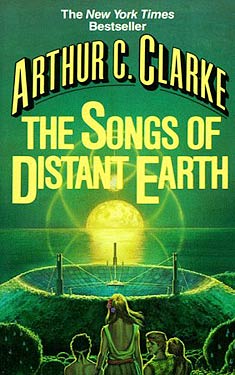Arthur C. Clarke
Completed 11/19/2023, Reviewed 11/20/2023
3 stars
As loved and prolific as Clarke was, I never found his books to be that amazing. I often found them a bit tedious with so much time spent on the science and so little effort spent on the characters. The Fountains of Paradise, one of his Hugo winners, was a yawner. His other Hugo winner, Rendezvous with Rama, was like Space Odyssey, full of wonder, but lacking character development. This book is not really full of wonder, but full of interesting science. It questions why there are so few neutrinos from the Sun striking the Earth and devises a 20% of the speed of light form of propulsion. There are a lot more characters than usual, and a lot more time with them. There’s not much development, but at least we get some human interaction.
Thalassa is a near-utopian colony inhabited by one of the early missions to escape the destruction of Earth from the Sun’s pending nova. When they landed, they had communication with Earth for a while until a volcanic event destroyed their comm link. About 700 years later, the spaceship Magellan approaches hoping to find the colony still alive. The ship carries almost a million people in suspended animation and is one of the last colony ships to leave Earth. A small delegation comes down to meet with the Lassans and offer to trade technology and art from the last centuries in exchange for millions of tons of ice from the ocean to use as a shield for their ship. Of course, intermingling occurs between the Lassans and the just over a hundred awakened crew. A few fall in love with the locals. A few want to stay rather than continue on to the ship’s original destination, Sagan 2. Several want to end the mission at Thalassa all together. This all causes some strife and human drama.
What I enjoyed most about the novel was that human drama. The characters are rather two-dimensional, but I actually liked them and empathized with them a little. They had some normal interaction and dialogue, though the emotion was sparse. One could say it was a little soapy and melodramatic, but I thought it wasn’t too bad. One thing I didn’t care for with the characters were some of their names. Some were borrowed from science fiction writers. Some were a little too close to other fiction, like Mutiny on the Bounty. Clarke even gives one of the characters who wants to abandon the mission to Sagan 2 the name Fletcher and has him reflect on whether his ancestors came from Pitcairn Island. The familiarity of the names was just a little too, well, cute.
I also enjoyed the discovery of a possibly sentient sea creature during the Magellan’s stay. It was a nice little scientific subplot that kept the book interesting. I found that part more interesting than the vacuum drive Clarke describes.
Like his other books, I give this three stars out of five. It’s simply too devoid of feeling. Even when one of the characters dies, there is little emotional response. One of the main characters from Thalassan asks her lover from the ship to explain the need for grief. Just too academic and stoic. I did like the brief allusion to a bisexual encounter, but again, not much in the way of emotional description. I’d say I liked this book about as much as Rama. It was entertaining, but ultimately, I felt hungry for something more substantial.

No comments:
Post a Comment